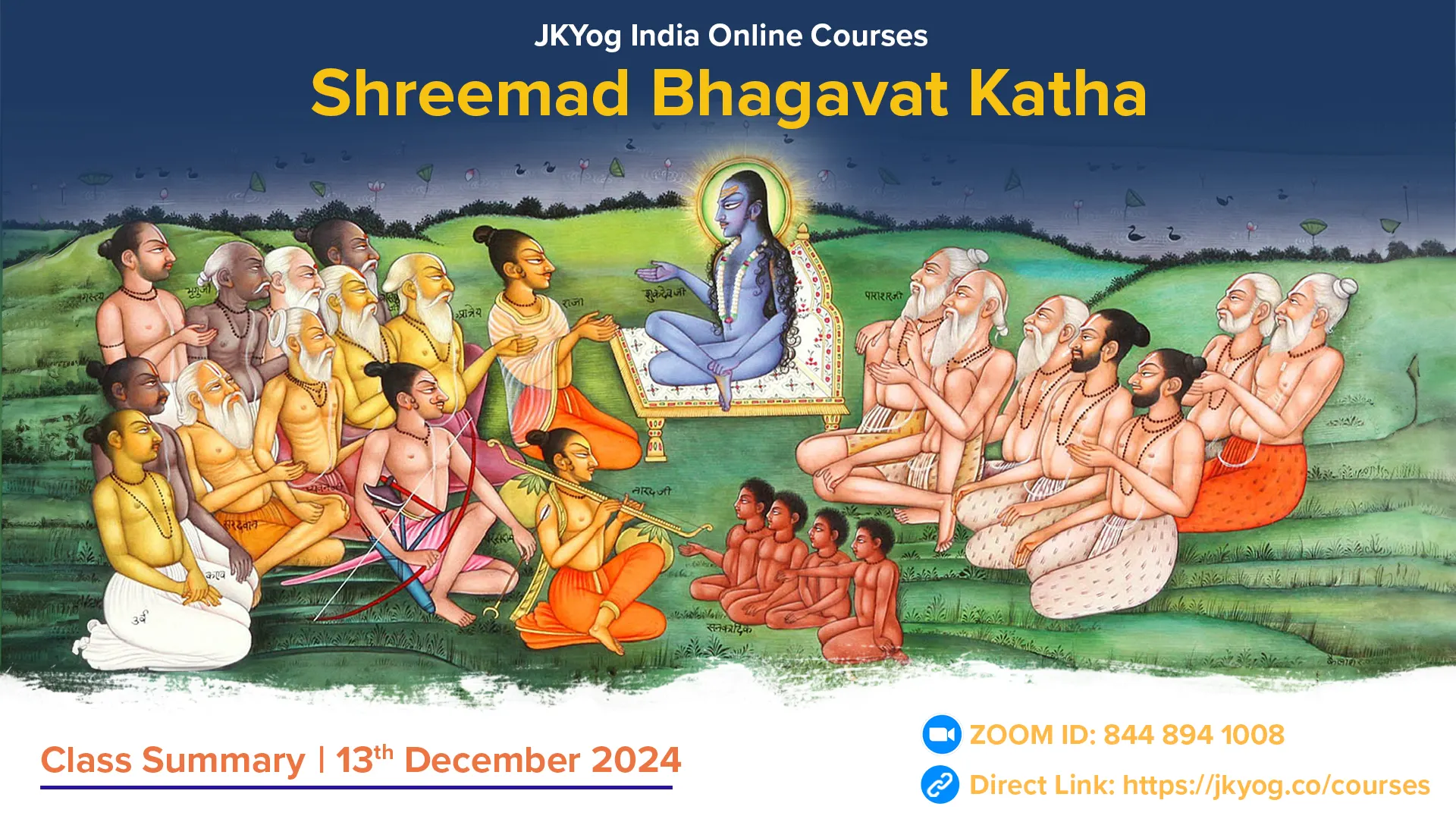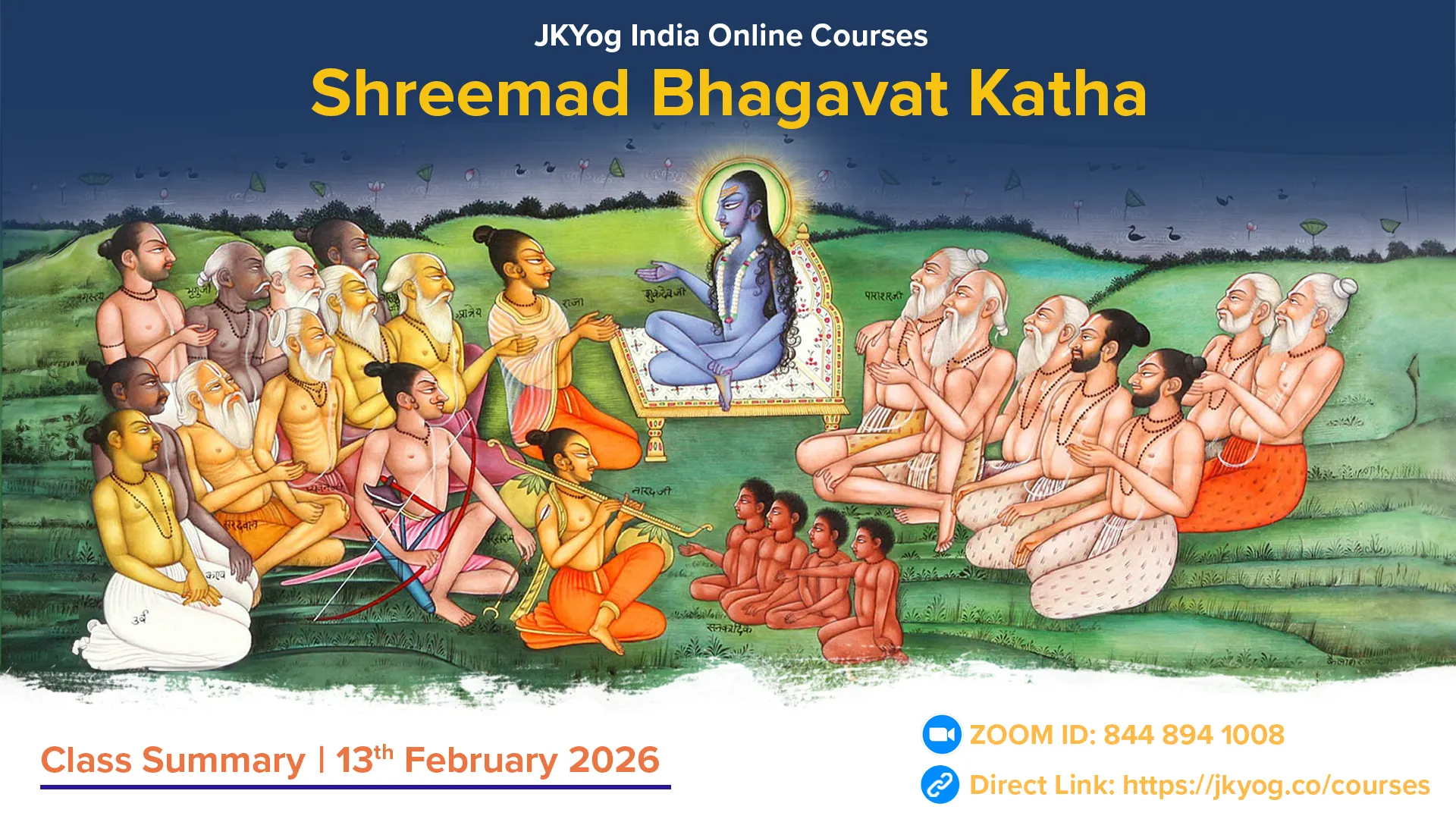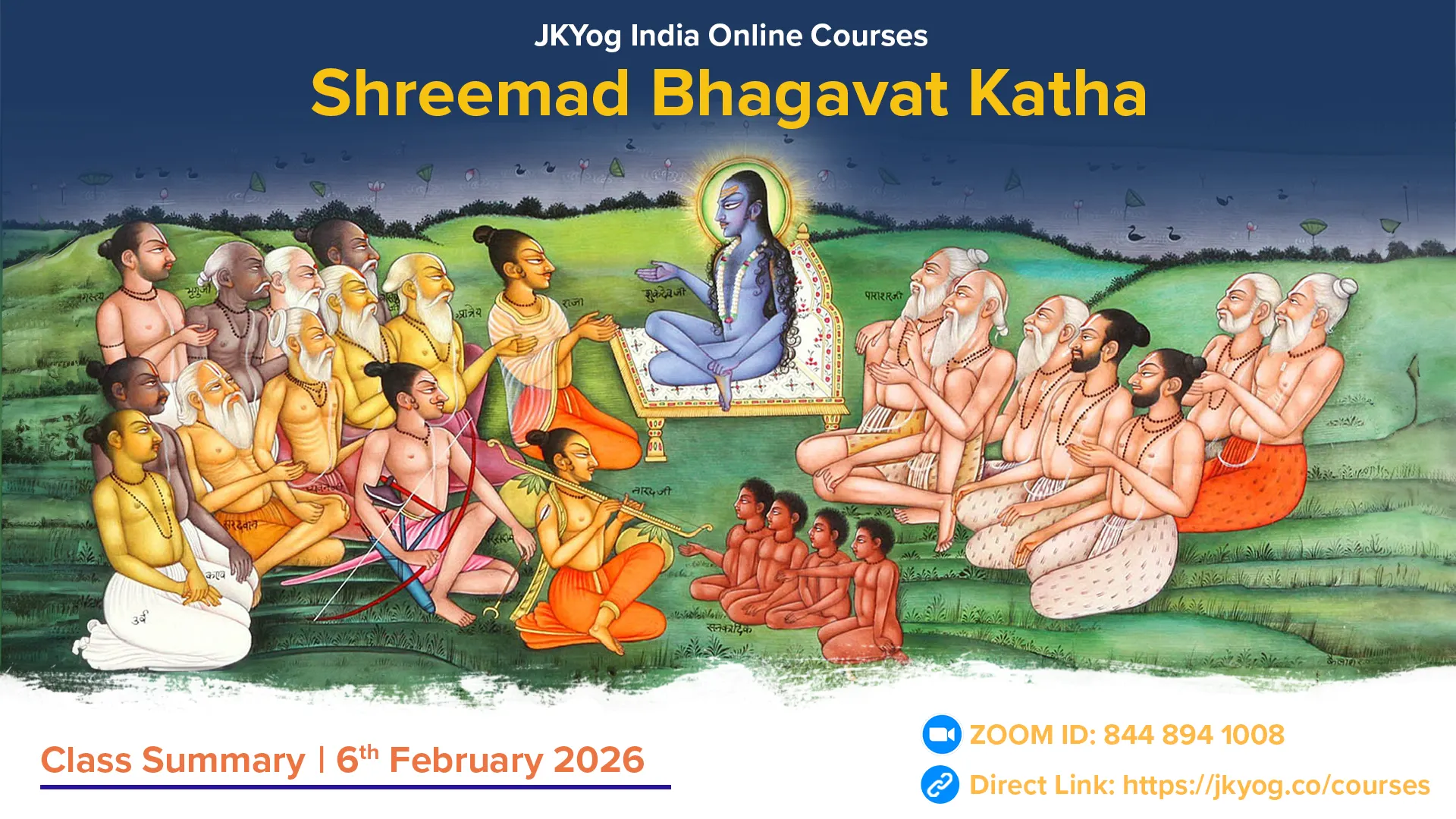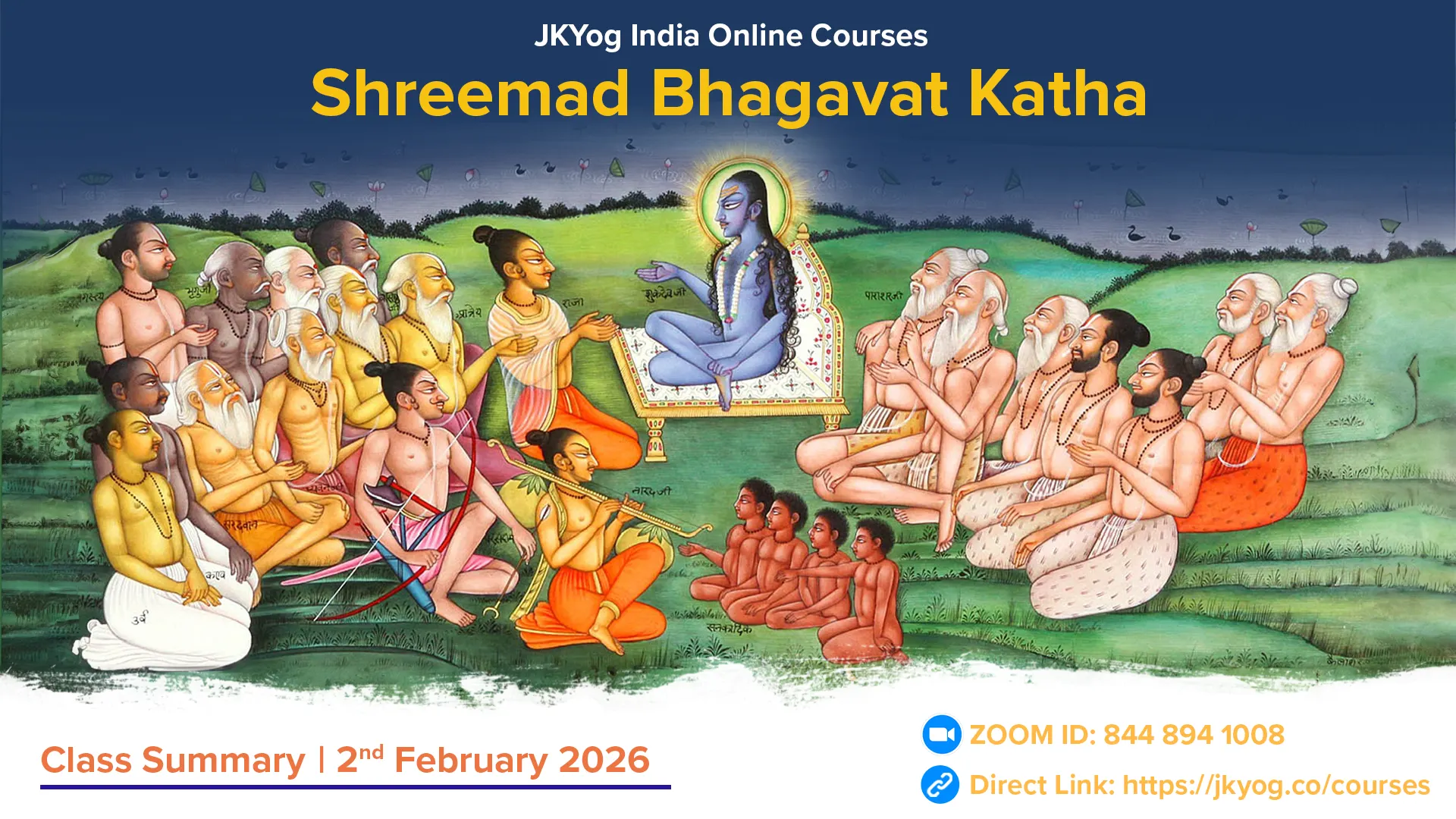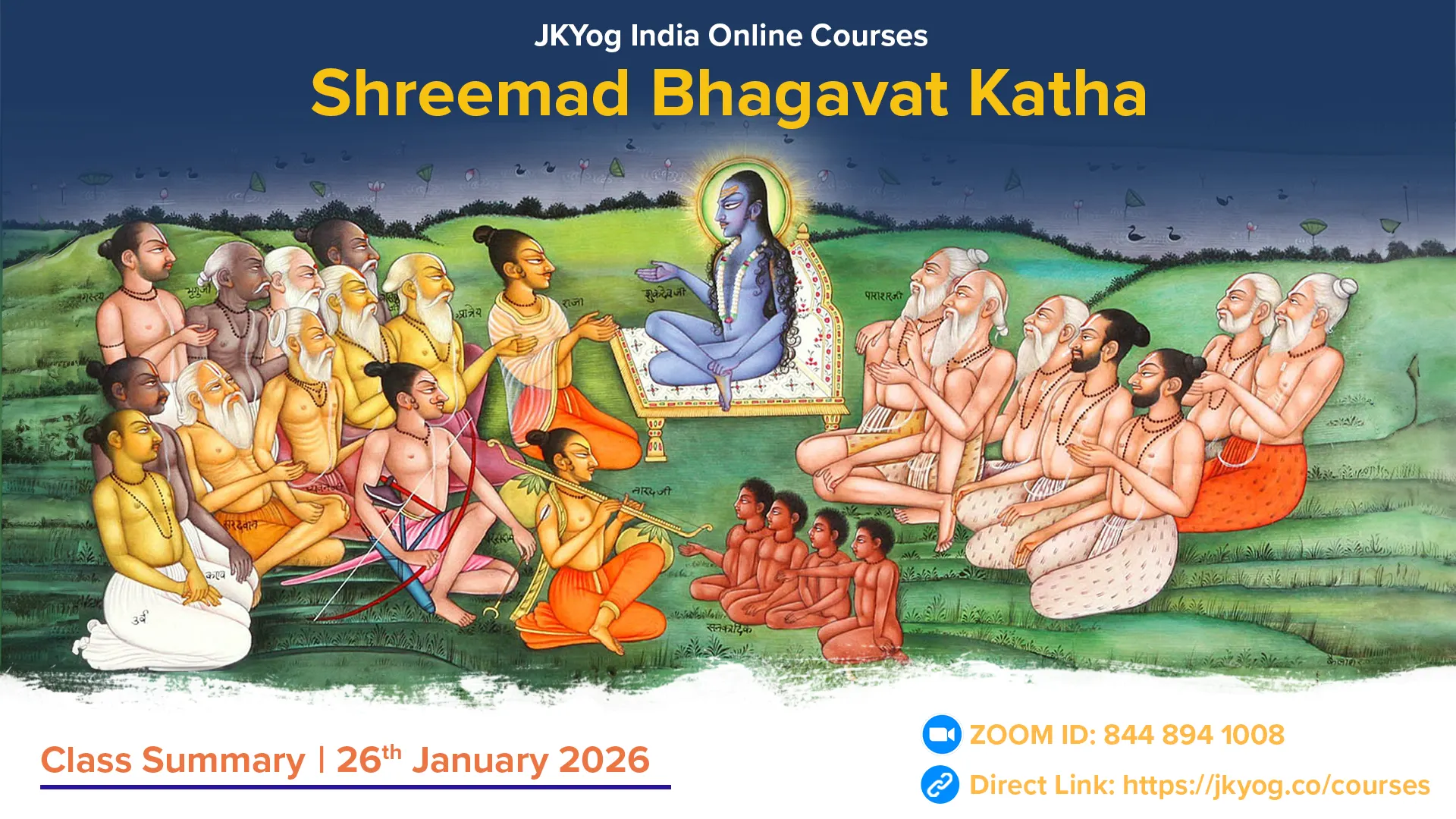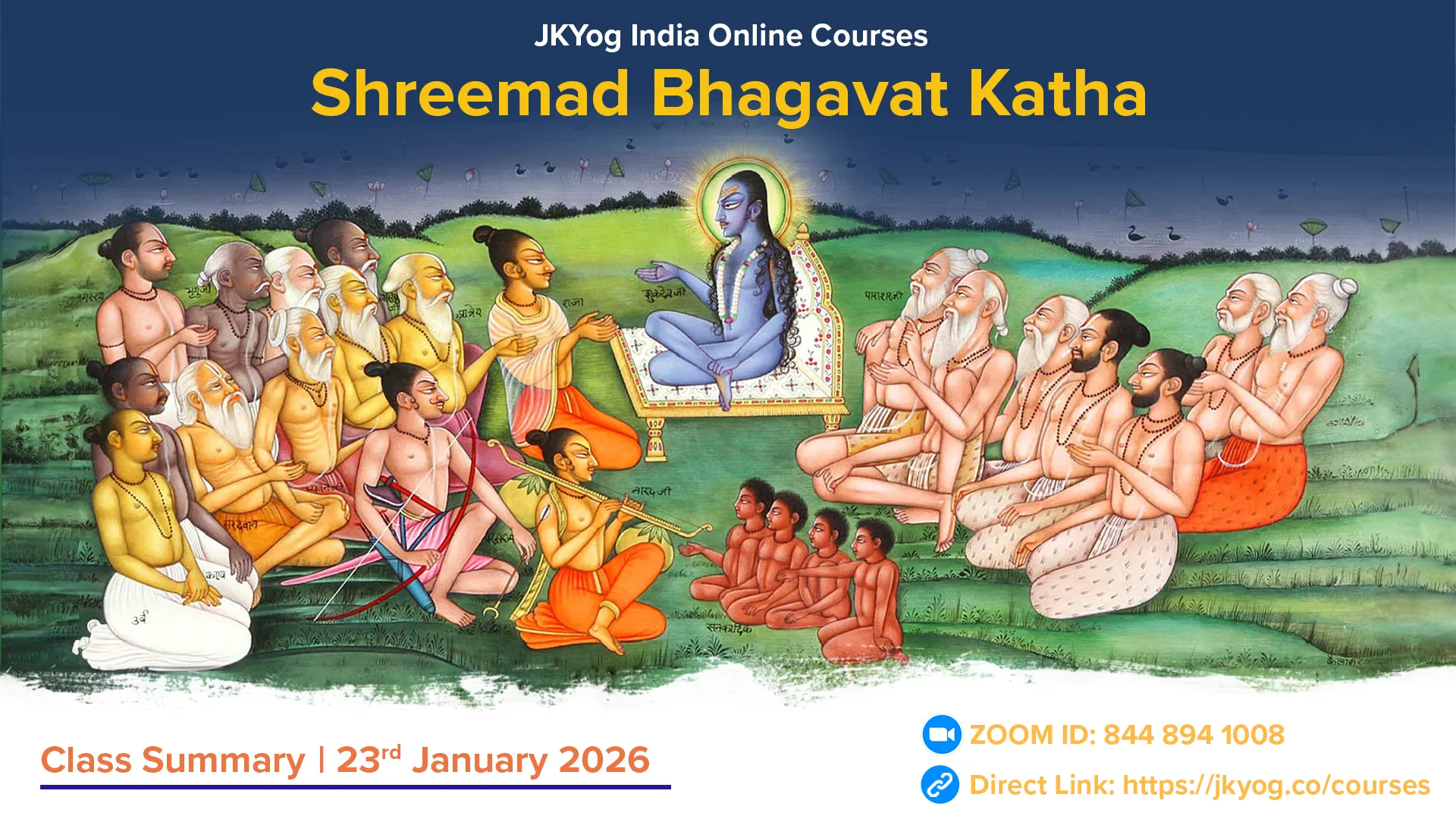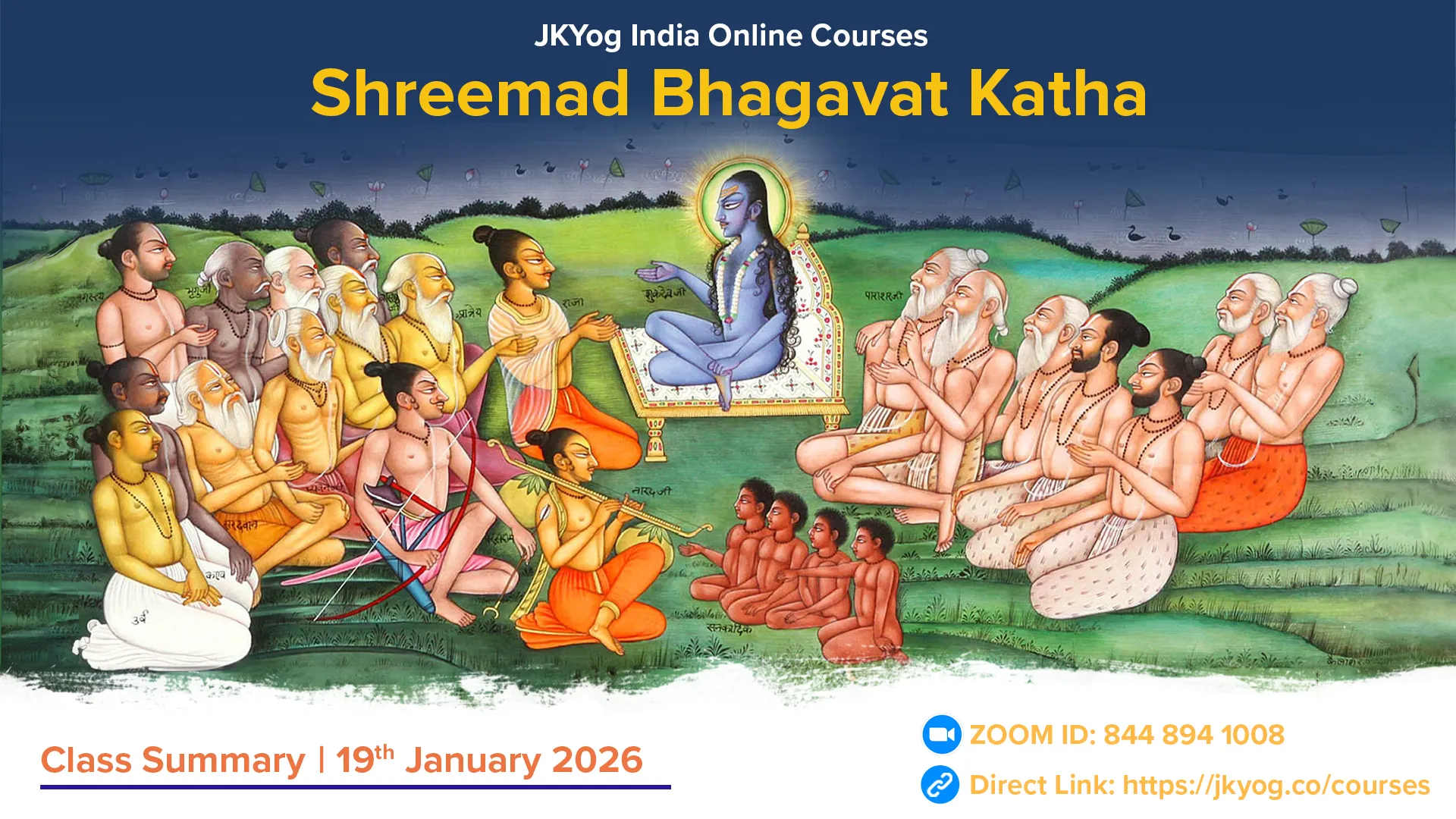Shreemad Bhagavat Mahapuran- Canto: 4, Chapters: 25-28
Shree Maitreyaji said to Vidurji, "Bhagwan Shiva imparted teachings to the Prachetas. The Prachetas worshipped Him with great devotion. After that, Standing in the water, the Prachetas performed austerities for ten thousand years, chanting the stotra taught by Bhagwan Shiva.
Meanwhile, King Prachinbarhi was deeply engrossed in ritualistic actions. Naradji came to guide him and asked, 'O King! What welfare do you seek from these actions? True welfare lies in ending all sorrows and attaining supreme bliss, which cannot be achieved through mere rituals.' The king replied, 'Naradji! My intellect is entangled in these actions. Kindly grant me the knowledge that will free me from this bondage of rituals.'
Naradji explained, 'O King! A person who considers children, spouse, and wealth as the ultimate purpose of life keeps wandering in the material world and cannot attain true welfare. Look at the animals you sacrificed in the yajnas. They are now standing in the sky, waiting for your demise. In the afterlife, they will attack and wound you with their horns in anger.'
The Tale of King Puranjan
After this, Naradji narrated the story of King Puranjan to the king. Long ago, there was a renowned and illustrious king named Puranjan. He had a friend named Avignyat. In search of a suitable place to reside, King Puranjan wandered across the entire Earth, but no place seemed suitable to him. Driven by his desire for indulgence, he visited many cities, but none matched his aspirations, leaving him despondent.
One day, he came across a marvellous city with nine gates in Bharat Khand, south of the Himalayas. This city was adorned with gardens, palaces, windows, and decorations of gold and silver. Its floors were made of sapphire, pearls, and gemstones, and the city appeared as divine as Bhogavatipuri. Its unique beauty lay in its gardens, ponds, the sweet melodies of birds, the spring breeze, and peaceful wildlife.
While wandering in this wondrous forest, King Puranjan saw a beautiful maiden who had arrived there unexpectedly. She was seeking a suitable husband. Accompanying her were ten servants and a five-hooded serpent guarded her. She was in the bloom of youth, with a shy demeanour, dusky complexion, and captivating features—her nose, cheeks, teeth, and radiant face were extraordinarily attractive. She wore a yellow saree, a golden girdle, and anklets that jingled as she walked, enhancing her charm. Her graceful gait resembled that of an elephant, and her demeanour was like that of a goddess.
King Puranjan, enchanted by her beauty, addressed her in a sweet tone, asking about her identity and origins and why she was in the forest. Her beauty, modesty, and affectionate glances unsettled the king’s heart. Overcome by feelings of love, he earnestly requested her to stay with him, comparing her to Devi Lakshmi. The king urged her to cast aside her shyness and reveal her face, as her melodious voice and unmatched beauty had completely captivated his heart.
The maiden, pleased by King Puranjan's affectionate proposal, smiled and replied that she had also been captivated by him. She said that she did not know her birthplace, name, or lineage, and she did not know who had created this city with nine gates. The maiden explained that the men accompanying her were her friends and the women were her companions, while the serpent protected her. She assured the king that she and her companions would provide him with all kinds of desired pleasures. She praised the householder’s life, stating that it is the foundation of Dharma, Artha, Kama, Moksha, and the welfare of the world. Those who renounce the world are deprived of these pleasures.
The maiden admired the king’s sweet smile, generous heart, and beauty and said, "What woman would not be happy to have such a husband?" After saying this, she took the king to the city. King Puranjan and his queen, Puranjani (the maiden), lived joyfully in that city for a hundred years. The bards would sing of the king's glory, and in the summer, he indulged in water sports with many women.
The city had a total of nine gates, seven of which were above, and two were below. Through these gates, the king travelled to different countries. In the east, there were five gates through which he would go to the regions of Vibhraajit, Saurabh, Bahudan, and Apan. In the south, there was the Pithah gate, which led him to the southern Panchal region, and in the north, there was the Devhoo gate, which led him to the northern Panchal region. In the west, there were two gates, the Asuri and Nirriti gates, through which he would travel to the regions of Gramak and Vaishas, respectively.
There were two blind citizens in the city who helped King Puranjan with his work, even though he was the king of the citizens with sight. King Puranjan’s heart was entangled in attachment and desires. He began to adopt the habits and actions of his queen. When the queen drank alcohol, he too drank and became intoxicated. Likewise, he began to partake in all her activities, such as singing, eating, running, and sleeping and even considered her emotional experiences his own. In this way, King Puranjan was deceived by his queen and, like a monkey imitating its master, he continued to follow her actions.
Naradji told Prachinbarhi, "One day, King Puranjan, carrying his bow, golden armour, and quiver, rode in a chariot pulled by five horses, accompanied by his eleventh commander. He went to the Panchprasth forest. The chariot was equipped with two shafts, two wheels, one axle, three flagpoles, five ropes, a bridle, a charioteer, a seat, two yokes, five weapons, and seven coverings. It was adorned with golden decorations and moved in five different motions.
The king, who found it difficult to be away from his beloved wife even for a moment, was so drawn to hunting that he cared not for her and, with pride, took his bow and arrows to hunt. At that moment, under the influence of demonic tendencies, his mind became hard and merciless, leading him to slaughter innocent wild animals. According to the scriptures, a king who desires to hunt should only kill animals that are necessary and permitted by the scriptures. However, King Puranjan indulged in excessive violence. This resulted in the painful death of many animals, and compassionate onlookers were deeply saddened by the scene."
King Puranjan, exhausted from hunting and troubled by hunger and thirst, returned to his palace. After bathing and eating, he rested and then, adorned with beautiful jewels, began searching for his wife. But he couldn't find her anywhere. Saddened, he asked the women of the palace, "O beautiful ones! Are you all healthy and happy as before? Why does this house seem different today? When a house is without a wife or mother, it is like a chariot without wheels. Tell me, where is my wife?"
The women replied, "We do not know what your beloved has decided today. Look, she is lying on the ground without a bed." Having lost his discernment with the attachment to his wife, King Puranjan became very distressed upon seeing her in a dishevelled state on the ground. He tried to comfort her in many ways. King Puranjan became so engrossed in his attachment to his wife that he lost track of time. As he spent time with her, he completely forgot self-realisation and wasted his youth.
Naradji said to Prachinbarhi that from Puranjani, King Puranjan had eleven hundred sons and one hundred and ten daughters, all of whom were virtuous and endowed with qualities such as modesty and generosity, thereby increasing their parents' fame. These children became known as Pauranjanis. In this way, half of the king’s long life passed by. Then, King Puranjan, in his role as the ruler of Panchal, arranged for the marriages of his sons with suitable brides and his daughters with appropriate grooms. Each of his sons had a hundred sons. King Puranjan’s lineage spread throughout the entire Panchal region with these descendants.
As his attachment to his children, grandchildren, home, treasury, servants, and ministers grew stronger, he became further entangled in these worldly affairs. Following the example of your (Prachinbarhi’s) own life, he also became consumed with the desire for various pleasures, and to fulfil these desires; he took initiation into the performance of severe yajnas involving animal sacrifice. These yajnas were meant to worship the gods, ancestors, and spirits. Thus, throughout his life, he remained heedless of the duties that lead to the welfare of the soul, being entirely engrossed in family matters. Ultimately, the time for old age arrived, a period greatly unpleasant for men attached to worldly pleasures.
One day, King Puranjan's city was attacked by Chandavega, the king of the Gandharvas, and his followers. Chandavega was accompanied by three hundred sixty Gandharvas and an equal number of Gandharvi women, who were engrossed in indulgence and looted the city. As these Gandharvas began to plunder King Puranjan's city, they were stopped by a five-headed serpent. This serpent had been protecting the city of Puranjan and had been fighting the seven hundred twenty Gandharvas for a hundred years. King Puranjan observed that his only protector, the serpent, had become weak, and he grew worried. For so long, he had been immersed in his city, his kingdom, indulgence, and attachment to his wife that he hadn't realised the impending danger.
During this time, Kaalkanya, daughter of kaal (death) also also known as 'Jara', wandered through the three worlds in search of a suitor, but no one would accept her. She was considered unfortunate, and people called her 'Durbhaga'. Once, King Puru had accepted her willingly to give his youth to his father, which made them happy and in return, Puru was granted the boon of the kingdom.
One day, I (Naradji) descended from Brahmalok to Earth, and while wandering, I met Kaalkanya. Although I was a strict celibate, she still desired me as her husband. I refused her request. In her fury, she gave me a terrible curse: "Since you have rejected my request, you will never be able to stay in one place for too long."
Disheartened by my rejection, she went to the Yavanraj and proposed that he become her husband. Upon hearing her request, the Yavanraj smiled and, wishing to carry out a secret task for the Creator, said to her: "I have decided, through yogic vision, that I will choose a husband for you. You are one who causes harm to everyone, and that's why no one accepts you. Therefore, you must remain unnoticed in this world and enjoy your desires forcefully. Take my army; with its help, you will be able to destroy all the people, and no one will be able to stand against you. This is my brother, Prajwar, and you will become my sister. I along with you both will roam through all the worlds with an invisible and powerful army."
Naradji explains that, under the command of Yavanraj, Prajwar and Kaalkanya encircled and began to destroy the city of Puranjan. King Puranjan saw that his wealth and material pleasures had vanished, and he had become impoverished, consumed by indulgence. His discernment had been lost, and the Gandharvas and Yavanas had taken away his prosperity. The king observed that the city was ruined, his family members had turned against him, and even his wife had become indifferent. The body of Kaalkanya had taken control of his life, and his mind was only focused on women and children. In this calamity, King Puranjan saw no way out.
When Prajwar, the brother of Yavanraj, set fire to the city, King Puranjan was engulfed in sorrow as he saw the burning corpses of his family and subjects. He began to worry about his family’s fate, though he should have understood that it was futile to grieve. Yavanraj captured him, and his city was destroyed. King Puranjan had to face the consequences of his actions. In the end, due to his attachment, he fell into misfortune and was reborn as a girl in the house of Vidarbhraj in his next life.
Puranjan's Rebirth as the Daughter of Vidarbharaj
In his next life, Puranjan was born as a daughter named Vaidharbi in the house of Vidarbharaj. When Vidarbharaj's daughter reached marriageable age, he announced that she would marry only the mightiest and most valiant warrior. Soon, King Malayadhvaja of Pandya conquered the cities of his enemies and married Vaidharbi. Together, they had seven sons, each of whom became the king of the seven regions of Dravid (Southern India). Each of these sons had many descendants who would enjoy worldly pleasures until the end of time.
The eldest daughter of Malayadhvaja was virtuous and dedicated to her vows. She married Sage Agastya, and they had a son named Dridahcyuta. Eventually, King Malayadhvaja, after distributing his kingdom among his sons, decided to go to Mount Malay to meditate and worship Bhagwan Shree Krishna. He undertook severe penance there for almost a hundred years, during which he gained an understanding of the distinction between the soul and Parabrahman, attaining ultimate peace.
Vaidharbi (Puranjan), his wife, decided to accompany him. She devoted herself to serving her husband on the mountain, but one day, when she could not feel the warmth of his feet, she became distressed. She went to her husband and began lamenting, and in her grief, she decided to perform sati by placing his body in the fire. At that moment, a Brahmin arrived and pacified her with his counsel.
Reunion of God and the Soul
The Brahmin said to Vaidharbi, "Who are you? Who is your father? And who is this man you are grieving for, the one who is lying here asleep? Do you not recognise me? I am the same friend with whom you used to wander before. Friend! Do you not remember that at one time, I was your unknown companion? You left me in search of worldly pleasures and came here. We were once friends and residents of the manas, like two swans living together for countless years without any abode."
"However, my friend, you left me behind in search of the pleasures of the senses and came to this world. While wandering here, you discover a place ruled by a woman. Upon arriving here, you saw a city with five gardens, nine gates, three fortifications, and many markets. This city was full of sensory pleasures, and its mistress was a woman. It was a city where, upon entering, a man loses his wisdom and forgets his true nature. Brother! Having fallen into the snares of its mistress and indulged in pleasures with her, you too forgot your true self, and this is how you fell into this pitiable state."
"See, you are neither the daughter of Vidarbharaj nor the wife of the mighty Malayadhvaja. You are not the wife of Puranjan, who had imprisoned you in the city with nine gates. In your past life, you considered yourself a man, and now you consider yourself a chaste woman. All of this is My illusion, created by My divine maya. In truth, you are neither a man nor a woman. Realise your true nature."
"My friend, I am what you are, and you are not different from me. If you reflect deeply, you will see that I am indeed what you are. Wise men do not perceive any difference between us. Just as a person looks at his reflection in a mirror or at another's eyes and sees different forms, in the same way, the one soul, through the dual filters of knowledge and ignorance, perceives itself as both God and the soul. When the swan (God) made this clear to her, the swan (soul) in the lake regained its true form, and the self-realisation that had been lost due to the separation from the friend was restored."
Naradji continues to explain to Prachinbarhi, "I have now indirectly shown you this knowledge of the self, for it is the indirect descriptions of the Creator and Lord of the universe that are more beloved to Him."
Symbolic Meaning of the Puranjan Story
- Puranjan = Represents the soul (Jeev), the individual living being.
- Avignyat = Refers to God (Ishvara), the Supreme Being, the unseen and unknown divine power.
- Nine-gated city = Symbolises the human body, which has nine openings (two eyes, two nostrils, two ears, mouth, genitals, and the anus).
- Puranjani = Represents the intellect or ignorance (Avidya), which leads the soul in the world of materialism.
- Ten Servants of Puranjani = Symbolises the ten senses (five Jnanendriyas – sensory organs, and five Karmendriyas – action organs), which act under the control of Puranjani (intellect or ignorance).
- Companions of Puranjani = These are the mental tendencies or vṛttis of the senses, which guide the actions and desires of the individual.
- Five-headed serpent = Represents the five pranas (vital airs), which are Pran, Apan, Vyana, Udan, and Saman, the life forces that govern the body.
- Chandveg = Represents time (kaal), the inevitable and unstoppable force that moves everything in the universe.
- Three hundred and sixty Gandharvas and as many Gandharvis under Chandveg = Symbolises day and night.
- Kaalkanya = Represents old age, which is inevitable.
- Prajwar = Refers to the fever of cold and heat, symbolising the physical and mental afflictions that arise during life.
- Yavanaraj = Represents death, the inevitable end of life, which brings the cycle of birth and death to a close.
Summary: JKYog India Online Class- Shreemad Bhagavat Katha [Hindi]- 13.12.2024

